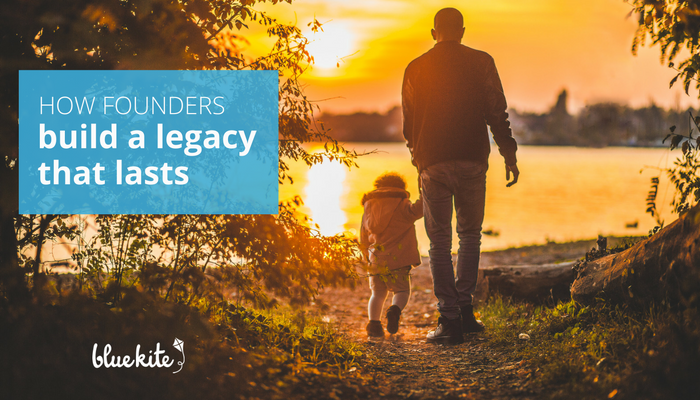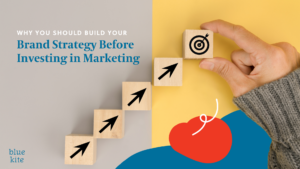I have the privilege of raising three boys. I remember each of the births like it were yesterday.
I can say that founding a business is the closest you can get to birthing and raising a child. It’s a long-term endeavor with great highs and lows. It requires knowledge and wisdom. It demands courage and patience. Founders are parents and like parents they want to make an impact.
There is something more. Deep down, founders create companies because they want to be remembered. My legacy will live on through who I’ve loved and what I’ve built.
I believe that’s why we have a special affinity for Founders at Blue Kite. We know that the legacies that Founders leave are critical for creating a better world.
But, building a world-changing legacy is tough. Legacy-building is broad and deep and requires a lifetime of attention. We spend a great deal of time thinking about culture and have boiled our observations and experience into seven keys to building your own legacy.
How Founders Build Legacy
Key #1: Know your purpose
We call it your “core why”. Your core why fuels your drive to create something that endures. You need to know why you “give a damn” before you can inspire others to follow your example.
We’re convinced that people love to work. They hate to work for something that isn’t worthy of their dedication and sacrifice. You will love valuable talent if they need the insight of Sherlock Holmes to decipher what you believe and why your vision matters.
Key #2: Recruit a visionary team
Laura’s mantra is “We’re better together.” This attitude inspires and reinforces a deeply collaborative culture that shapes every decision made at Blue Kite. Your culture will have different values but the goal is the same, select 10X visionaries who can get things done.
You cannot build a legacy alone. That’s why the top global brands were started by co-founders, and sustained by equally brilliant executive leadership. The only thing worse than a “small thinking” leader is a “small-thinking” leadership team. The leadership team always amplifies the strengths and weaknesses of the company. You can’t afford a misstep by settling for C-Players.
Key #3: Build inspirational relationships
The greatest good you can do for another is not just to share your riches, but to reveal to him his own – Benjamin Disraeli
I’m an introvert. I really enjoy the company of my family and friends, but I cherish my “alone” time.
My preference for solitude worked brilliantly when I started Pushing Social. I could go into my office, shut the door, and work without help or interruption. But my isolation soon led to burnout. The worst part is that I couldn’t lean on anyone for support or inspiration. Thankfully, I recognized what was happening and intentionally began building inspirational relationships.
During this time, I learned the importance of servant leadership. Simply, you get more when you give more. Inspire someone and they will look for ways to motivate and inspire you. I also discovered that a self-help book can’t create healthy teams. It takes a leader willing to build into others.
Key #4: Craft an intentional culture
Organizations — both profit and nonprofit — decay over time.
Uninspired leaders leave. Bored employees cut corners. Customers churn.
Ironically, organizations built around compensation-based cultures flame-out faster than most. Just look to Enron, Lehman Bros, Countrywide Mortgage and you’ll see that brilliant people are only as good as the culture they build and the vision they pursue.
Unfortunately, most organizations unwittingly create a compensation-based culture by default. If you aren’t relentlessly shaping an intentional culture then expect dissatisfaction and departures to accelerate while profit and passion plummets.
Your legacy will be built on your organization’s culture. Don’t leave this to chance.
Key #5: Learning-Focused vs Failure-Focused
It’s trendy to embrace failure. The snappy alliteration of “Fail Fast” is hard to forget.
The human brain, however, is a funny thing. Stripped down to its core, your brain is a goal seeking computer. The first goal is survival. The second goal is happiness. Tell me that failure is “ok” and I will fail fast and frequently. I will build pristine arguments that celebrate and rationalize my failure. I’ve seen startups use the “Fail Fast” pseudo-logic and subsequently fail their way to bankruptcy.
Failure is a painful reminder of what not to do. Learning is the positive reinforcement critical for evolving better solutions. I often encourage our team members to “Deploy, Observer, Optimize, and Decide”. The end-result, success or failure, is important but not as important as the process. We want everyone to “Succeed Fast” and work hard on a process that ensures more hits than strikes.
Your legacy depends on others growing and evolving their skills and perspectives quickly. Failure is a useful tool but a poor coach.
Key #6: Encourage Rest
I camp for a week with my family every year. This has been a tradition for the last decade. Only this year did I truly “rest.”
Rest is elusive for Founders because there is always something to do. Founders also tend to criminalize relaxation. We believe that if you are resting you are wasting time, our most cherished resource. This “always be working” attitude quickly infects their workplace, sapping the legacy-building vitality of the organization.
We’ve all worked in organizations that turned hours-worked into currency. Our families, friends, health and sanity became collateral damage. This thinly-veiled workaholism is a weapon of mass destruction that kills legacy.
If you care about legacy, rest and demand that your team finds creative ways to rest too. The positive benefits of rest on productivity isn’t negligible. It’s exponential.
Key #7: Seek Blue Oceans
It’s been ten years since I read W. Chan Kim and Renee Mauborgne book Blue Ocean Strategy. This book has made a profound impact on how I help clients businesses grow.
In a nutshell, businesses that position themselves in new markets succeed. It seems obvious but it isn’t. Most businesses compete for a share of existing pie.
For example, a landscaping company will “benchmark” their competition and try to win business by offering lower prices or faster turnaround. Their competitor reacts by lowering their prices and shortening their turnaround. Soon, the landscaping “vertical” is a red-ocean stained by cut-throat competition.
On the other hand, Blue Ocean strategy dictates examining the competitive landscape and finding ways to transcend the competition. Using this approach, our landscaping company could decide to turn lawn care into a “rest and relaxation alternative” for its clients. For example, the company will help you map out a strategy for getting your video game obsessed kids playing outside, assisting you with tending a garden that doesn’t require hours of weed pulling, while immaculately grooming your lawn. This approach opens up a new market – a Blue Ocean.
Blue Ocean minded founders always build legacy-defining organizations. We reference Southwest Airlines, Apple Computer, Microsoft, Tesla, Google, and Buffer often because their founders have positioned their businesses in Blue Oceans. Their future is secure because their culture is wired to seek and invent opportunity.
Start Now.
Legacy is built on vision, decisive decision-making and sustained action. Like an apple tree, you must start building your legacy today if you want enjoy the fruit of your labor.



